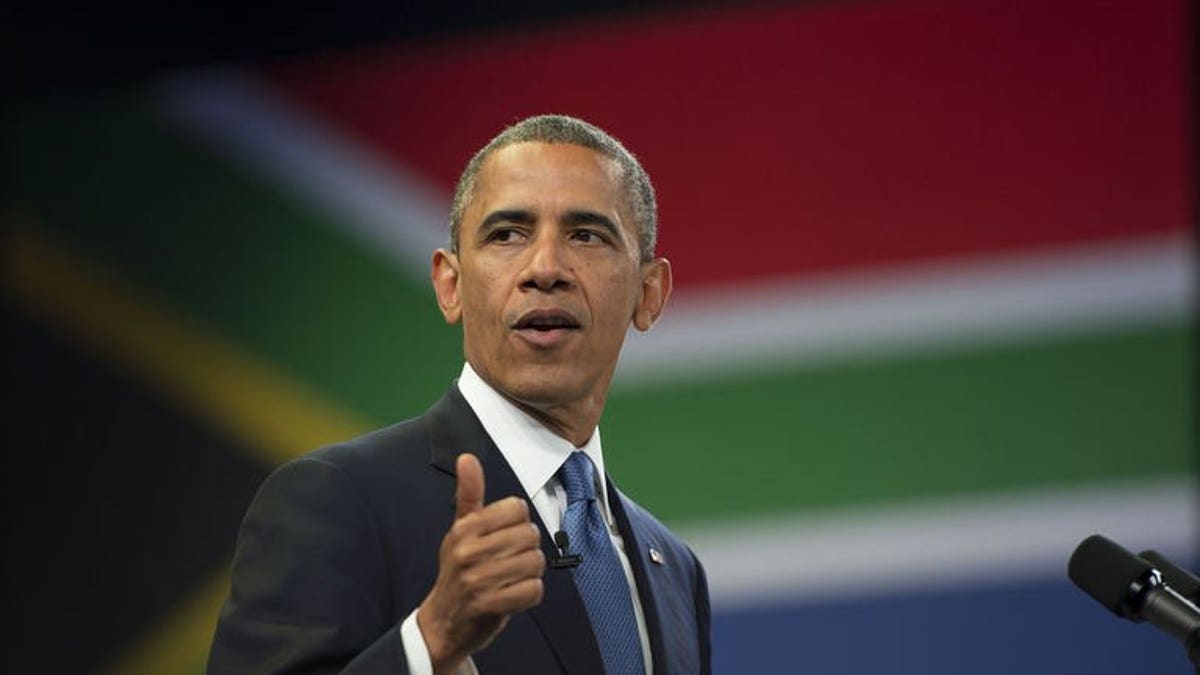
US President Barack Obama speaks during a meeting at the University of Johannesburg Soweto in Johannesburg, South Africa, June 28, 2013. Obama will host a landmark summit of leaders from across sub-Saharan Africa next year, the White House says, jostling with China for economic influence in the region. (AFP/File)
CAPE TOWN (AFP) – US President Barack Obama will host a landmark summit of leaders from across sub-Saharan Africa next year, the White House said on Sunday, jostling with China for economic influence in the region.
The plan has strong echoes of high-profile China-Africa summits, which over the last decade have cemented Beijing's clout on the continent.
Obama will announce on Sunday that "he plans to host the first of its kind, a summit of leaders from across sub-Saharan Africa in the United States," said senior White House advisor Ben Rhodes.
"This is something that we've never done before. It's something that other nations have done," said Rhodes.
Obama is currently on the first major visit to the continent where his father was born since his election almost five years ago.
He made a brief visit to Ghana in 2009. Critics say a more substantial trip had been long overdue and have accused Obama of allowing China to steal ground from the United States in business and diplomacy.
"What we want to do is to continue the type of high-level engagement that we've had in this trip, we want to have that marker laid down so that next year the President is bringing together heads of state from across sub-Saharan Africa in Washington," said Rhodes.
Speaking in the iconic township of Soweto on Saturday, Obama dismissed talk of a Chinese and US scramble for influence on the continent, but urged Africans to watch out for lop-sided deals with foreign investors.
"I actually welcome the attention that Africa is receiving from countries like China and Brazil and India and Turkey."
But he urged African nations to make sure trade was not a one-way street.
"When we look at what other countries are doing in Africa, I think our only advice is make sure it's a good deal for Africa."
"Somebody says they want to come build something here: Are they hiring African workers? Somebody says that we want to help you develop your natural resources: How much of the money is staying in Africa?"
Obama, in South Africa on the second-leg of a three-nation Africa tour, said that too often foreign investment did not benefit locals and actually encouraged the type of corruption and resource-stripping that guts economies.
"I do think that it's important for Africans to make sure that these interactions are good for Africa."
"There has been a long history of extracting resources from Africa, you take raw materials, you send them to someplace else where they get used processed, sometimes sold back to Africa.
"The profits stay there, the jobs stay there, and not much stays in Africa."
Obama offered up the United States as a more equitable partner which wanted African economies to grow into consumer powerhouses.
Strong economies would mean the United States would get "somebody to trade with, to sell iPods to, airplanes, all kinds of good stuff."
Amid a raft of Chinese investment in Africa, which topped $200 billion last year, US businesses have expressed concern that Africa is a diplomatic blind spot for their government.
In March, China's new President Xi Jinping visited Africa, as well as Russia, on his first foreign trip, signing a raft of business and energy deals signalling Beijing's intent to deepen ties further.








































